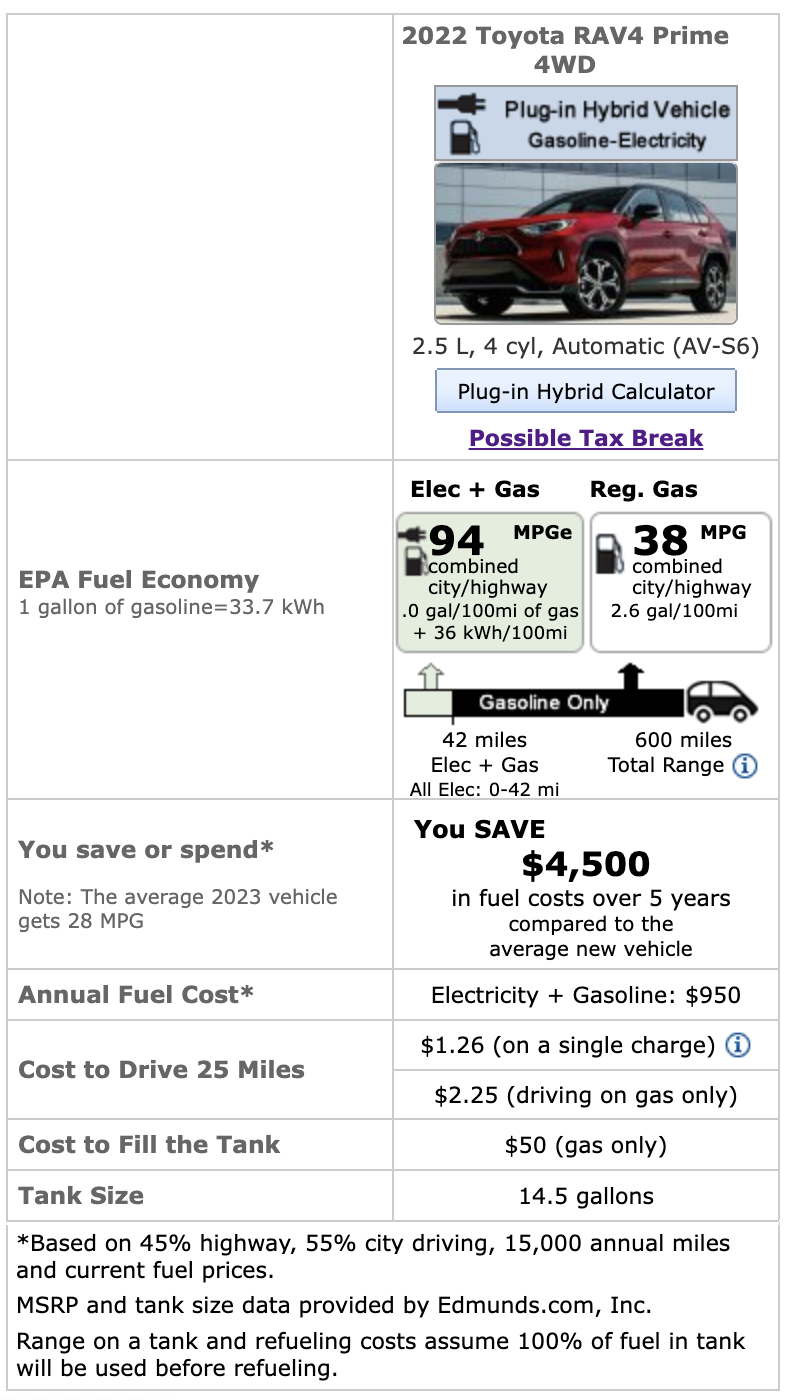Cars - Gas vs Hybrid vs PHEVs
- February 6, 2023
- by Angela

Some simple math can help us tell if a hybrid car is worth buying. It all depends on the price of gas and how much you drive. Many years ago, while we were driving gasoline and diesel cars, we never thought we would ever drive a hybrid or electric vehicle. What are plugin hybrid vehicles? Why are PHEVs more expensive than hybrid vehicles? I will answer these and other questions in this article.
What are hybrid and plug-in hybrid cars?
A traditional hybrid vehicle combines an electric motor with a gasoline engine. This combination produces much better fuel efficiency, usually about double what you would get in a regular car. Even though a hybrid uses "electric" and "battery" components, it only runs on gasoline.
Taking this a step further, a plug-in hybrid, or PHEV has a larger battery that can power the car for a daily commute without using any gasoline. When that battery is exhausted a traditional internal combustion engine takes over. That allows PHEVs to have a long overall range, yet avoid burning gas for typical use provided it is plugged in every night to recharge. The total eclectic plus gas range varies by model. Typical "EV only" range for a PHEV is 20-40 miles, but when including gas the range is 400-600 miles total.
How are hybrid and plug-in hybrid cars charged?
Another way to think about the difference is how these hybrids are charged. While a traditional hybrid electric battery can only be charged from an internal combustion engine, a plug-in hybrid electric battery is charged using an outlet.
So how long does it take to charge a plug-in hybrid electric vehicle? It depends if you are using a standard 120 outlet (level 1 charging), or if you have a dedicated 240 outlet and charger (level 2 - 3). Level 1 is the slowest charging rate, but the cheapest since no extra equipment is needed. The higher you go in levels the faster the car charges, but it requires purchasing extra equipment and running a dedicated circuit. At level 1 charging a PHEV will typically take 8-12 hours (think overnight). At level 2 or 3 it will be a matter of a few hours. It all depends on the battery's kilowatt hour capacity (kWh), the vehicle's charging capacity, and the charger's capacity to supply power.
How much cheaper is driving a PHEV?
Getting down to the "cost per mile" with a PHEV depends on the vehicle's efficiency numbers and the actual price of gas and electricity in your area. Some states have expensive gas and relatively cheap electricity and some states are the opposite.
The EPA puts out figures on a vehicle's fuel / battery efficiency. For example, here is what is says for a 2022 Toyota Rav4 Prime:
The key figures are it gets 36 kWh / 100 miles, 38 MPG city/highway combined, with 14.5 gallon tank, and a total range of 600. All these figures are estimates and in reality the range and performance may be less.
Now that we have this data we can do some math to figure out a "per mile cost".
For the sake of argument let's say one gallon of gas is $4.00. Let's also say the cost of electricity in your area is $0.15 including all taxes, fees, etc.
In EV mode the Rav4 Prime can go 100 miles per 36 kWh which would cost 36 (kWh) * 0.15 ($/kWh) = $5.40.
To travel the same distance on gas only would require (100 miles / 38 mpg) * $4.00/gallon = $10.53.
So EV mode is roughly half the price per mile in this scenario. If gas is cheaper, or electricity is more expensive that tilts the equation in favor of gas.
Do hybrids "pencil out" in the long run?
Even though the cost per mile on a PHEV might be half, does that translate into savings for the customer? It depends on the number of miles you plan to put on the car. From this you can get an idea of the cost savings you might enjoy with a hybrid or PHEV. If all or most of your driving fits within the battery's range then you can use that as a cost per mile. The more you drive the more you save with a fuel efficient vehicle.
Let's consider 3 different Toyota Rav4s, the regular internal combustion engine (ICE) model, the hybrid model, and the PHEV.
|
ICE Model |
Hybrid Model |
PHEV Model |
|
|
Extra purchase price |
$0 |
$3,000 |
$10,000 |
|
MPG Combined |
30 MPG |
40 MPG |
94 MPGe / 38 MPG |
|
Cost / 100 miles @ $4.00/gallon |
$13.33 |
$10 |
$5.40 (assumes 100% EV use) |
|
Fuel cost to drive 50,000 miles |
$6,666 |
$5,000 |
$2,700 |
|
Fuel savings over ICE model |
n/a |
$1,666 |
$3,966 |
|
Total savings including purchase price |
n/a |
-$1,334 |
-$6,034 |
So based on the table above over 50,000 miles, with gas at $4.00/gallon the hybrid is $1,334 more expensive and the PHEV is $6,034 more expensive. This means for hybrids to make sense the price of gas either needs to go up, or the price of the hybrids needs to come down. That is why the federal, state and local incentives are there to make PHEVs on par or better vs ICE cars. For a real break even to happen it would take closer to 100,000 miles for the hybrid and 125,000 for the PHEV. However by then you might be looking at a replacement battery which is $$$.
One additional point is hybrids and especially PHEVs are typically more powerful, quieter, and have extra options and features not found on the comparable ICE model. So even though the cost is higher you are getting "more car". People who purchase these vehicles are also getting the satisfaction of buying less gasoline and helping the environment which can be a deciding factor.
This analysis doesn’t include any extra maintenance the Hybrid or PHEV would require but let’s pretend it is all covered by the warranty (which it typically is). All 3 vehicles would still need standard oil changes, tires, etc so there is not much difference to factor in there.
Is it time for hybrid vehicles to pull over?
Hybrid vehicles were designed to not only save on gas, but namely to reduce air pollution. However, they still burn gas which creates emissions.
In an effort to fight climate change several states have passed laws that ban the purchase of new gasoline-only cars starting in 2035. After which time only PHEV and pure EVs will be available. Used hybrids and gasoline vehicles will be exempt. California was the first to pass this law, with many other states following their lead including: Colorado, Connecticut, Delaware, Maine, Maryland, Massachusetts, New Jersey, New York, Oregon, Pennsylvania, Rhode Island, Vermont, Virginia, Washington, and Washington D.C.
Are electric cars much better for the environment?
Electric cars are better for the environment because they reduce air pollution and CO2 emissions. This is true where the car is being driven. However, there is another side of the coin in this story. If the electricity used to charge the car comes from a fossil fuel source such as coal, natural gas or oil, the emissions are just shifting from one place to another.
In addition batteries for smartphones, laptops, medical devices, and EVs are made of lithium. Lithium mines don't have the cleanest track record and have damaged nearby ecosystems including farms and communities. EVs also require rare earth metals for their motors which has an even more atrocious track record than lithium mining in terms of human rights and environmental degradation.
So to complete the loop there needs to be three things in place:
- EVs get charged via renewable energy sources (solar, wind, hydro). Home owners who install solar panels can address this themselves regardless of what their local electric utility does to generate power.
- EV battery recycling. Manufacturers and private companies are taking an interest in this because there is so much to be gained. Money and jobs related to EV battery recycling are slowly building, but we are still in the early days of EV adoption..
- EV motor design that reduces / eliminates certain rare earth metals. BMW is ahead of the game on this, with their motors not requiring any rare earth metals.
Conclusion: Given that standard gasoline powered cars and even gas hybrid vehicles will be available for another 12 years, it is still necessary to think about the trade offs compared to an EV or PHEV. Right now, they are still a luxury and not the most cost effective unless you drive a lot or already have solar.









